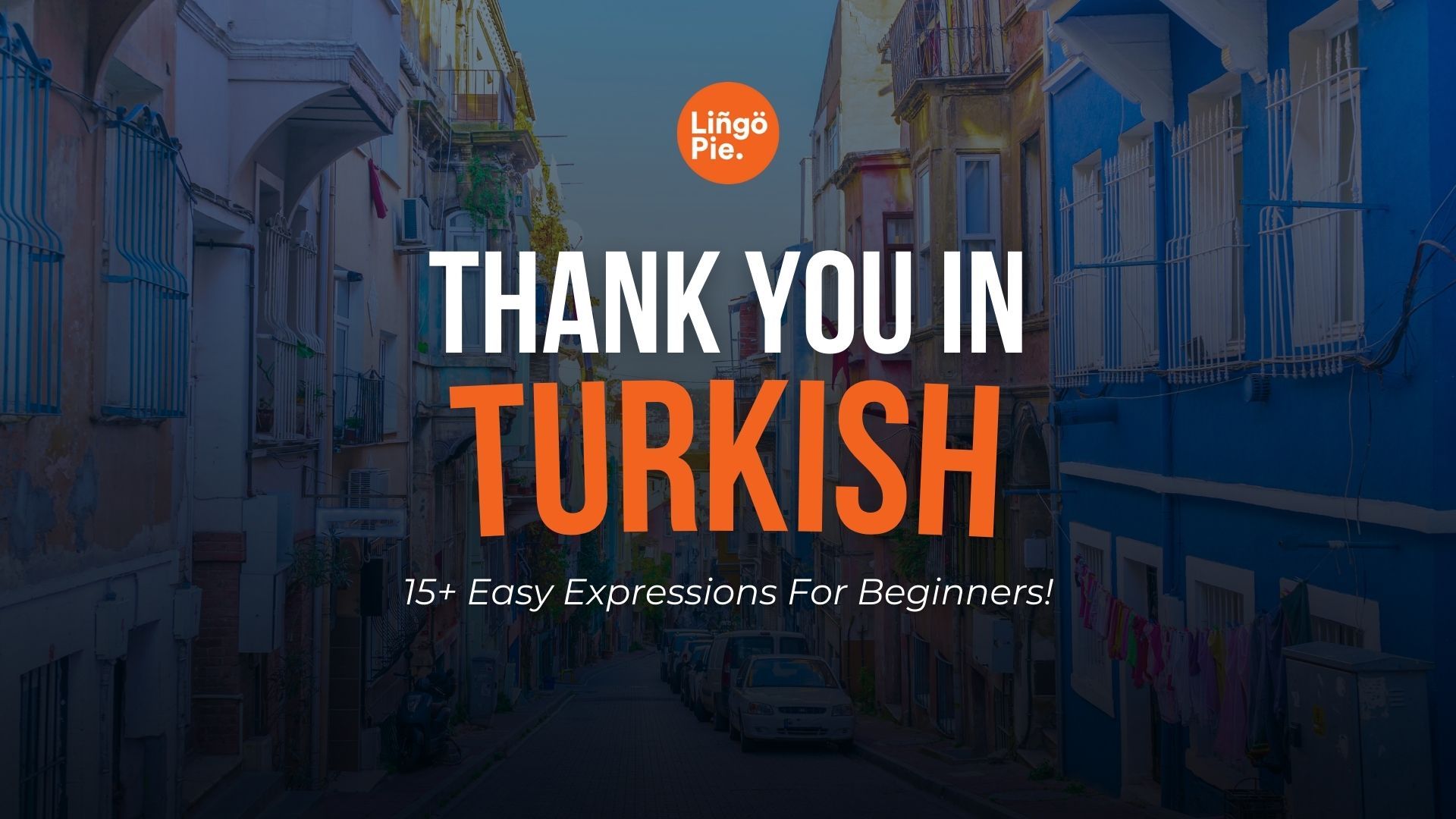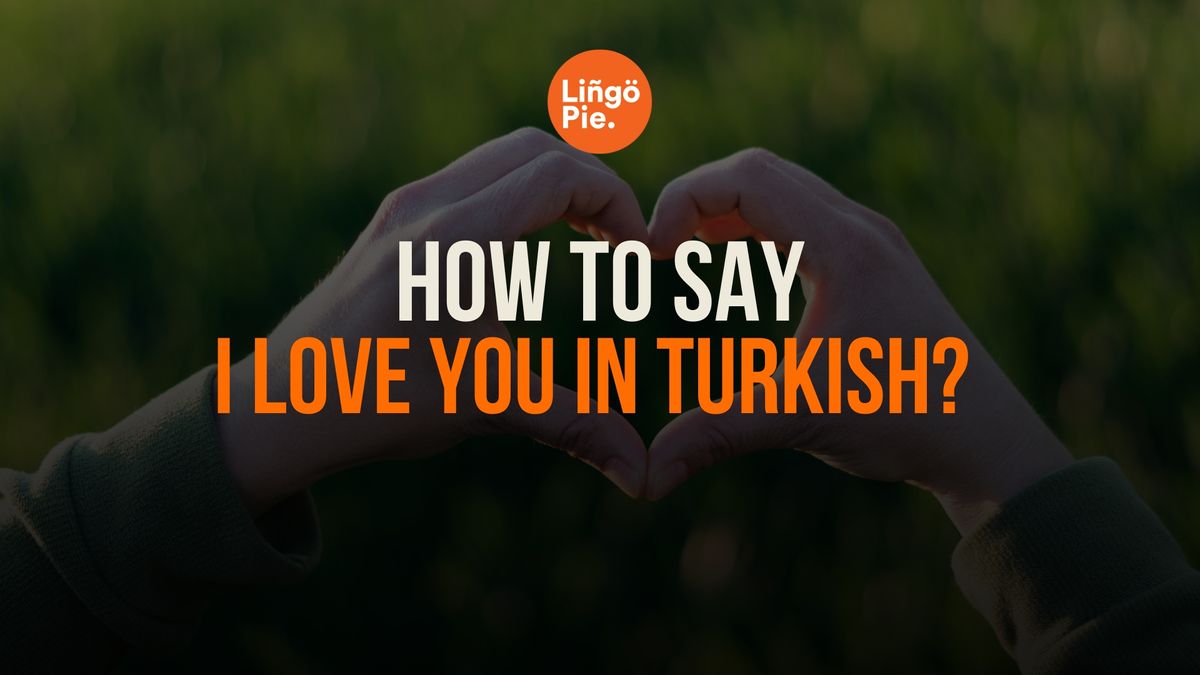Expressing love and appreciation is a big part of Turkish culture. Whether among family, friends, or romantic partners, Turks are known for their warm and affectionate way of speaking.
As a Turkish learner, knowing how to say I love you in Turkish and give compliments in Turkish will help you sound more natural and connect more deeply with native speakers.
In this article, you'll learn the essential phrases to say I love you in Turkish along with other Turkish compliments.
- How To Say Thank You In Turkish?
- Gaming Terms In Turkish
- Curse Words In Turkish

How To Say I Love You In Turkish
The direct way to say “I love you” in Turkish is Seni seviyorum. The breakdown is clear: seni means “you” (object form), sev is the verb root meaning “to love,” and -iyorum indicates present continuous tense, so it literally means “I am loving you.” This is the standard romantic expression used between partners.
For emphasis, you can say Seni çok seviyorum, where çok means “very,” making it “I love you very much.” In earlier stages of dating, people may say Senden hoşlanıyorum, which means “I like you” and expresses romantic interest without the full weight of declaring love.
Other Ways To Say I Love You In Turkish
Aside from “Seni seviyorum,” Turkish offers several meaningful ways to express love depending on emotional depth and context. You can say “Sana aşığım,” which means “I am in love with you,” and carries strong romantic intensity.
For long-term commitment, “Sensiz yaşayamam” means “I can’t live without you,” while “Benim her şeyimsin” translates to “You are my everything.”
If you want something softer, “Seni çok özledim” means “I miss you very much,” and “Hayatım” (my life) is commonly used as a term of endearment. Turkish expressions often focus on devotion and emotional closeness, so tone and sincerity matter when choosing which phrase to use.
Romantic and Flirty Turkish Phrases

If you're learning Turkish and want to express romantic feelings, knowing a few flirty and affectionate phrases can be a great way to impress your special someone.
Turkish is a poetic and expressive language, making it perfect for romance. Whether you’re in a relationship or just playfully flirting, these phrases will help you charm your way into someone’s heart!
❤️ Sana bayılıyorum! – I adore you!
This phrase is a fun and affectionate way to express admiration for someone. It can be used in both romantic and playful contexts.
💖 Sen benim için çok özelsin. – You are very special to me.
A sweet way to let someone know how much they mean to you. This phrase is heartfelt and sincere, perfect for deepening emotional connections.
💕 Kalbimi çaldın. – You stole my heart.
This phrase is commonly used in romantic conversations to express falling in love with someone.
🔥 Seni görünce kalbim hızla atıyor. – When I see you, my heart beats fast.
A dramatic yet charming way to express excitement and attraction.
💘 Gülüşün içimi eritiyor. – Your smile melts me.
A poetic way to compliment someone's smile and show affection.
😘 Sensiz hayat çok sıkıcı olurdu. – Life would be so boring without you.
A playful yet romantic way to express how much someone means to you.
💕 Bana bir masal anlatır mısın? Çünkü seninle her şey rüya gibi. – Can you tell me a fairy tale? Because everything feels like a dream with you.
A flirty and poetic phrase that can add some charm to your conversations.
Turkish people love expressing emotions through words, so don’t hesitate to use these phrases to brighten someone’s day. A well-placed romantic phrase can make all the difference!
Read Also:

Turkish Compliments for Different Situations

Giving compliments is an essential part of Turkish communication. Whether you're admiring someone's appearance, personality, or achievements, a well-placed compliment can help build strong relationships. Turkish people are warm and expressive, so don’t be shy about using these phrases!
Compliments on Appearance
If you want to compliment someone’s appearance in Turkish, the structure is usually direct and adjective-based. For women, “Çok güzelsin” means “You’re very beautiful,” while for men, “Çok yakışıklısın” means “You’re very handsome.”
Here are some common appearance compliments in Turkish:
| Turkish Phrase | Meaning | Usage |
|---|---|---|
| Çok güzelsin | You’re very beautiful | Complimenting a woman |
| Çok yakışıklısın | You’re very handsome | Complimenting a man |
| Harika görünüyorsun | You look amazing | Gender-neutral compliment |
| Bugün harika görünüyorsun | You look amazing today | Emphasizing today’s appearance |
| Gözlerin çok güzel | Your eyes are very beautiful | Romantic compliment |
| Gülüşün çok güzel | Your smile is very beautiful | Sweet, personal compliment |
| Çok çekicisin | You’re very attractive | Romantic or flirty tone |
| Tarzın çok güzel | Your style is very nice | Complimenting fashion |
Turkish compliments are usually straightforward and sincere. Adding small words like bugün makes them feel more natural and personal.
Compliments on Personality
Complimenting someone’s personality in Turkish usually follows a simple structure: “Çok + adjective + -sin”, which means “You are very…” For example, “Çok naziksin” means “You are very kind.”
Here are some common compliments on personality in Turkish:
| Turkish Phrase | Meaning | Usage |
|---|---|---|
| Çok naziksin | You are very kind | Friendly or romantic |
| Çok tatlısın | You are very sweet | Affectionate tone |
| Çok zekisin | You are very smart | Admiration |
| Çok komiksin | You are very funny | Playful compliment |
| Çok düşüncelisin | You are very thoughtful | Appreciative tone |
| Çok samimisin | You are very sincere | Emotional closeness |
| Çok sabırlısın | You are very patient | Respectful compliment |
| Kalbin çok güzel | Your heart is very beautiful | Deep romantic compliment |
| Çok güçlü birisin | You are a very strong person | Emotional support |
| Sen gerçekten özelsin | You are truly special | Romantic or heartfelt |
These phrases are direct and natural in Turkish. Choosing the right adjective helps express genuine admiration without sounding exaggerated.
Compliments for Achievements and Skills
In Turkish, compliments about achievements and skills often use the structure “Çok + adjective + -sin” (You are very…) or “Gerçekten + adjective” (Really…). These expressions are commonly used to show admiration for someone’s hard work, talent, or success.
Here are some common compliments for achievements and skills:
| Turkish Phrase | Meaning | Usage |
|---|---|---|
| Çok başarılısın | You are very successful | Academic or career praise |
| Seninle gurur duyuyorum | I am proud of you | Celebrating achievement |
| Gerçekten yeteneklisin | You are truly talented | Skills or artistic ability |
| İşini çok iyi yapıyorsun | You do your job very well | Professional compliment |
| Harika bir iş çıkardın | You did a great job | Completed task or project |
| Çok çalışkansın | You are very hardworking | Effort and dedication |
| Çok iyi bir liderisin | You are a very good leader | Leadership skills |
| Sunumun çok iyiydi | Your presentation was very good | Public speaking |
| Çok hızlı öğreniyorsun | You learn very quickly | Learning ability |
| Gerçekten etkilendim | I’m really impressed | General admiration |
These compliments work well in professional, academic, or romantic contexts. Adding “gerçekten” (really) makes the praise feel stronger and more genuine.
Read Also:

How Do Turks Express Love and Affection?
In Turkish culture, emotional expression is sincere but measured. Phrases like “Seni seviyorum” are not used casually and usually signal serious romantic commitment. Saying it too early in a relationship can feel premature.
Affectionate words such as “canım” (my dear) or “hayatım” (my life) are common, but context determines meaning. These can be used romantically, between close friends, or even within family. The tone and relationship matter more than the literal translation.
Turkish compliments often focus on sincerity rather than exaggeration. Overly dramatic expressions may sound unnatural unless the relationship is already established. In early stages, softer phrases like “Senden hoşlanıyorum” (I like you) are more appropriate.
Understanding this cultural balance helps you avoid sounding either too distant or overly intense.
Read Also:

Learn Turkish with Lingopie
\
Expressing love and appreciation is a big part of Turkish culture, whether in romantic relationships, friendships, or family bonds. From saying “Seni seviyorum” to giving heartfelt compliments, learning these phrases will help you connect more deeply with Turkish speakers. Remember, words are just one part of communication—using the right tone, body language, and gestures makes your expressions even more meaningful.
The more you hear and practice these phrases, the more naturally they’ll come to you. One of the best ways to improve your Turkish listening and speaking skills is through authentic Turkish content—like TV shows and movies!
If you want to hear these romantic and affectionate phrases in real-life conversations, Lingopie is a fantastic resource. With Lingopie, you can watch Turkish dramas, romantic comedies, and more while learning the language naturally. The interactive subtitles and vocabulary features will help you pick up new words effortlessly.
Start watching and learning today! Try Lingopie here!






![How To Say Love In Different Languages [120+ Ways]](/blog/content/images/size/w1200/2024/11/How-To-Say-Love-In-Different-Languages--120--Ways-.jpg)



